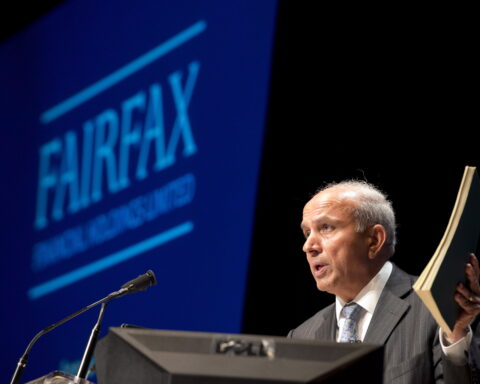The Church of England has announced it will divest from Shell, finally acknowledging the failure of more than a decade of investor efforts to convince the oil and gas sector to align with global climate goals. But Canada’s homegrown investor initiative, Climate Engagement Canada (CEC), has yet to realize that when it comes to fossil fuel companies, engagement is both misguided and futile.
CEC is a finance-led initiative, launched in 2021 and inspired by Climate Action 100+, the investor initiative that guided the Church of England’s attempts to engage Shell. CEC “drives dialogue” to help Canadian companies transition to net-zero. The project includes major long-term investors such as the Healthcare of Ontario Pension Plan (HOOPP), the Investment Management Corporation of Ontario, OMERS and the University Pension Plan. CEC’s initial list of engagement targets consists of 39 companies listed on the Toronto Stock Exchange. Its recently launched Net Zero Benchmark lays out a robust set of indicators to guide these engagements.
Engagement can often be an important tool for investors. However, when it comes to the 10 oil, gas and pipeline companies targeted by CEC, an active ownership approach is a dead end.
That’s the conclusion reached in June by the Church of England Pensions Board, which had tried to engage the oil and gas sector for over a decade, including leading a “very intensive” investor engagement with Shell, the world’s second– largest investor-owned oil and gas company.
Canadian investors have long taken the engagement route with oil companies, with little to show for it. Engagement is worthwhile only if it’s viable for a company to do what you’re asking. And for institutional investors like pension funds, engagement must come with a strong degree of likelihood that the company can generate long-term value while meeting your demands.
But it’s neither viable nor profitable for fossil fuel companies to decarbonize or to meet CEC’s expectation that they “develop and implement a comprehensive strategy to reduce GHG emissions … consistent with the goals of the Paris Agreement.”.
To do so, they would need to go beyond investing billions in unproven, uneconomical and unscalable carbon capture and storage technologies to eliminate their upstream operational emissions. They also have to phase –down the production and sale of fossil fuels in order to address the larger problem: life–cycle emissions, which are largely the result of the end– use combustion of their products.
Aligning fossil fuel companies with climate goals requires a rapid production decline this decade, with a complete wind– down of all production destined for combustion by 2050 at the latest. It is not prudent to assume the industry can generate strong financial returns for investors at the same time that it voluntarily phases itself out, while also addressing its massive and growing liabilities. These are not financial risks our pensions should be exposed to, especially when fossil fuel investments have already underperformed relative to the wider market over the last decade.
If fossil fuel companies can’t profitably be engaged to phase out production, should investors be trying to engage them at all?
One might argue that engagement could lead to short-term emissions reductions. For example, reducing methane emissions would yield fast and significant emission cuts in the oil and gas sector. However, methane regulations are moving forward from the government, and compliance ultimately rests with the regulator, not the investors.
One might also argue that engagement is better than selling shares to investors who don’t care about environmental performance. But there’s little evidence that pension funds’ ownership of oil and gas companies has led to meaningful emissions reductions. It’s hard to see this dynamic improving when the company’s business model is irreconcilable with achieving climate goals.
The fossil fuel industry itself provides a compelling reason to give up on engagement: fossil fuel companies are busy walking back their climate commitments.
After telling investors that it would cut production each year for the rest of the decade, Shell now says it will invest $40 billion more in oil and gas production in the next 12 years, with production remaining stable until 2030. This was the last straw for the Church of England Pensions Board, whose chief executive officer finally realized that the oil and gas sector doesn’t have “sufficient ambition to decarbonize in line with the aims of the Paris Agreement.” The respected investor is now divesting from all fossil fuels by the end of 2023 and will no longer try to engage with oil and gas.
The fossil fuel industry itself provides a compelling reason to give up on engagement: fossil fuel companies are busy walking back their climate commitments.
We’ve seen this before. BP claimed it would reinvent itself as a renewables company, setting early and ambitious targets. Yet despite 10 of its top institutional investors being members of Climate Action 100+, BP has also walked back its 2030 climate targets. It’s no wonder that a June report from Net Zero Tracker concluded that fossil fuel companies’ net-zero plans were “largely meaningless.”
Certainly, some CEC participants are already mapping out routes to net-zero and discovering that fossil fuel companies don’t have a profitable way to get there.
HOOPP, for example, recently announced that as of 2025 it would end new private investments in coal and oil. It is, however, baffling that HOOPP recognizes fossil fuels’ financial risks and incompatibility with climate safety in its private portfolio, yet –– like other CEC participants –– the fund continues to hold shares in publicly –traded fossil fuel companies, as if these companies somehow have a different prognosis. For pension funds, holding such shares will become a drag on delivering the pension promise.
Investors can better protect their beneficiaries’ savings by eliminating their fossil fuel exposure and pushing governments to use all available tools to responsibly oversee a managed decline of oil and gas production and demand while ensuring a just transition for the sector’s workers.
One of the world’s most experienced engagement leads, the Church of England Pensions Board, has walked away from oil and gas. Canada’s climate– conscious investors could look naive, and risk losing money, if they continue to act as if these companies have a future worth investing in.
Laura McGrath is pension engagement manager at Shift: Action for Pension Wealth and Planet Health.







